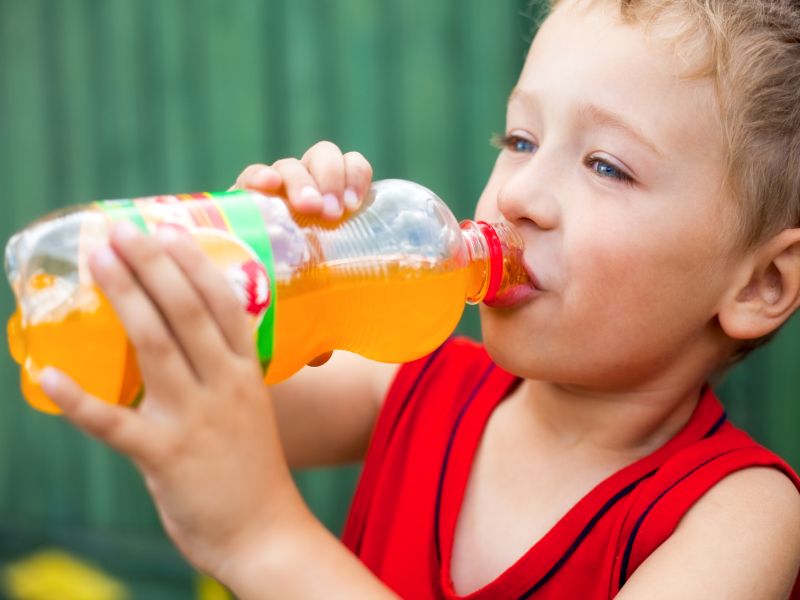

Kids' Sugary Drink Habits Start Early
Two-thirds of U.S. children consume one or more sweetened beverages daily, report findsThursday, January 26, 2017

THURSDAY, Jan. 26, 2017 (HealthDay News) -- Despite health messages to limit sodas and other sugary beverages, most American children drink them often, new government statistics show.
Nearly two-thirds of boys and girls ages 2 to 19 drink at least one sugar-sweetened beverage daily, according to the U.S. Centers for Disease Control and Prevention.
The national survey of dietary habits from 2011 to 2014 also found that sweetened beverages account for more than 7 percent of total calorie intake for kids.
"For children, studies have shown that consuming sugary beverages is associated with weight gain, type 2 diabetes and dyslipidemia [high cholesterol], all of which have serious negative downstream health consequences," said CDC researcher Asher Rosinger.
Consumption of sugary drinks -- including sports drinks, juices and sweetened coffee -- is also linked to heart disease and tooth decay, among other problems, the researchers said.
Intake of these drinks is highest among 12- to 19-year-olds, but it's not clear why. "Our report did not look at parental behaviors, like supervision or attitudes toward dietary guidelines, which may modify kids' behaviors," Rosinger said.
Currently, nearly 13 million U.S. children and teens are obese, putting them at risk of serious future health problems such as diabetes and heart disease.
The new report is based on results of the 2011-2014 U.S. National Health and Nutrition Examination Survey: Among the other findings:
- Boys are more likely than girls to down one or more of these drinks a day -- 65 percent versus 61 percent.
- On average, boys consume 164 calories a day from sugar-sweetened liquids, compared to 121 calories for girls.
- Among preschool boys and girls, sweet drinks account for about 4 percent of total daily calories. By the teen years, they are responsible for almost 10 percent of daily calories.
The researchers also found racial and ethnic differences, with Asians drinking fewer sugary drinks compared to other groups.
The sugar-sweetened beverages included in the study were regular soda; fruit drinks (including sweetened bottled water and fruit juices and nectars with added sugars); sports drinks; energy drinks; sweetened coffee and tea; horchata and sugar cane drinks. The researchers did not include diet drinks, 100 percent fruit juices, beverages with sweetener added by the consumer, alcohol or flavored milk.
One bright spot: Overall caloric intake from sugary drinks has declined slightly -- from 155 six years ago to 143, according to the new report.
Current dietary guidelines for Americans advise limiting added sugars from all sources to less than 10 percent of total daily calories. The guidelines also recommend avoiding beverages with added sugars.
There are plenty of reasons to shun sweetened drinks, said Dallas nutritionist Lona Sandon.
"Added sugar does not give us any nutritional value," said Sandon, program director and assistant professor of clinical nutrition at the University of Texas Southwestern Medical Center.
Soda is also likely to replace drinks that are higher in nutritional value, such as milk, she said.
Also, "some sodas are high in phosphorous, and diets high in phosphorous may have long-term effects on bone health," Sandon added.
The calories from sugary drinks are "empty," and won't keep you feeling full, Sandon explained. Instead of sugary beverages, she recommends plain or flavored water without added sugar, low-fat milk or vegetable juice.
The report was published Jan. 26 as a U.S. National Center for Health Statistics Data Brief.
In another CDC report, Rosinger and colleagues looked at sugary beverage consumption among adults for 2011 to 2014. About half drank at least one of the drinks daily, with men more likely than women to do so.
SOURCES: Asher Rosinger, Ph.D., M.P.H., researcher, U.S. Centers for Disease Control and Prevention; Lona Sandon, Ph.D., R.D.N., L.D., program director and assistant professor, clinical nutrition, University of Texas Southwestern Medical Center, Dallas; U.S. National Center for Health Statistics Data Brief, Jan. 26, 2017
HealthDay
Copyright (c) 2017 HealthDay. All rights reserved.
News stories are written and provided by HealthDay and do not reflect federal policy, the views of MedlinePlus, the National Library of Medicine, the National Institutes of Health, or the U.S. Department of Health and Human Services.
- More Health News on:
- Carbohydrates
- Child Nutrition








































No hay comentarios:
Publicar un comentario